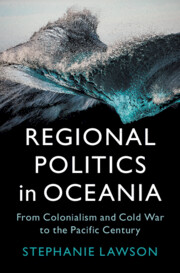Book contents
- Regional Politics in Oceania
- LSE International Studies
- Regional Politics in Oceania
- Copyright page
- Dedication
- Contents
- Preface
- Acknowledgements
- A Note on Sources and References
- Abbreviations
- Maps
- 1 Oceania and the Study of Regions
- 2 Demarcating Oceania
- 3 Colonizing Oceania
- 4 Regionalizing Oceania
- 5 Transformations in Regional Organization
- 6 Regionalism the ‘Pacific Way’
- 7 The Politics of Subregional Identity
- 8 The Forum in Regional Politics
- 9 Democracy and Culture in Regional Politics
- 10 The Spectre of Regional Intervention
- 11 The Political Economy of Regionalism
- 12 Geopolitics in the Pacific Century
- 13 Conclusion
- Select Bibliography
- Index
7 - The Politics of Subregional Identity
Published online by Cambridge University Press: 15 February 2024
- Regional Politics in Oceania
- LSE International Studies
- Regional Politics in Oceania
- Copyright page
- Dedication
- Contents
- Preface
- Acknowledgements
- A Note on Sources and References
- Abbreviations
- Maps
- 1 Oceania and the Study of Regions
- 2 Demarcating Oceania
- 3 Colonizing Oceania
- 4 Regionalizing Oceania
- 5 Transformations in Regional Organization
- 6 Regionalism the ‘Pacific Way’
- 7 The Politics of Subregional Identity
- 8 The Forum in Regional Politics
- 9 Democracy and Culture in Regional Politics
- 10 The Spectre of Regional Intervention
- 11 The Political Economy of Regionalism
- 12 Geopolitics in the Pacific Century
- 13 Conclusion
- Select Bibliography
- Index
Summary
This chapter discusses the political salience of the Melanesia–Micronesia–Polynesia divide and its manifestation in subregional organizations: the Melanesian Spearhead Group and the Micronesian President’s Summit along with the Micronesian Chief Executive’s Summit and the Polynesian Leaders’ Group. All operate independently of the metropolitan powers. The Melanesian approach to valuing local traditions, encapsulated in ‘kastom’ discourses, have had a distinctive anti-colonial slant, but not an explicit anti-democratic stance. Also, the fact that the Pacific Way was akin to a ‘Polynesian Way’ in its early manifestation may explain the emergence of ‘Melanesianism’ as an alternative expression of identity. Until recently, Micronesia had demonstrated the weakest of subregional identities. A common Micronesian culture has rarely been expressed and subregionalism revolved largely around pragmatic issues. In the context of contemporary Forum politics, however, an explicit Micronesian identity has been asserted vis-à-vis the other two subregions, highlighting that it is the political context that largely determines how cultural identities are deployed.
Keywords
- Type
- Chapter
- Information
- Regional Politics in OceaniaFrom Colonialism and Cold War to the Pacific Century, pp. 172 - 197Publisher: Cambridge University PressPrint publication year: 2024



